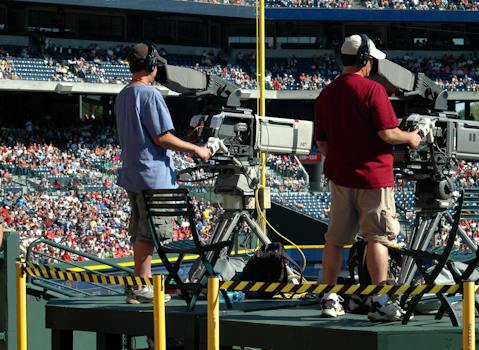

-
Table of Contents
"Unleashing the Power of Technology: Transforming Football into the Future"
Introduction
Technology has had a profound impact on various aspects of our lives, and the world of sports is no exception. In recent years, technology has been revolutionizing the game of football, enhancing both the performance of players and the overall experience for fans. From video assistant referees (VAR) to wearable technology and data analytics, technological advancements have brought about significant changes in the way football is played, officiated, and enjoyed by millions around the globe. In this article, we will explore some of the key ways in which technology has transformed the game of football, ushering in a new era of innovation and excitement.
The Impact of Video Assistant Referee (VAR) Technology in Football
The game of football has been around for centuries, captivating audiences with its fast-paced action and thrilling moments. Over the years, technology has played a significant role in revolutionizing the sport, enhancing the overall experience for players, coaches, and fans alike. One such technological advancement that has had a profound impact on football is the Video Assistant Referee (VAR) technology.
VAR technology was introduced to football in an effort to minimize human error and ensure fair play. It involves the use of video footage and advanced computer algorithms to assist referees in making crucial decisions during a match. This technology has been implemented in various leagues and tournaments around the world, including the FIFA World Cup and the English Premier League.
The introduction of VAR technology has had a significant impact on the game, both on and off the field. One of the most notable effects is the increased accuracy in decision-making. Referees are now able to review contentious incidents, such as goals, penalties, and red card offenses, with the help of video replays. This has led to a reduction in incorrect decisions and has ultimately improved the overall fairness of the game.
Furthermore, VAR technology has also had a profound impact on the dynamics of the game. Players and coaches now have to adapt to the presence of VAR and its potential influence on the outcome of a match. The introduction of VAR has led to a more cautious approach from players, as they are aware that their actions can be scrutinized and potentially penalized upon review. This has resulted in a decrease in reckless challenges and diving, as players are more conscious of the consequences.
In addition to its impact on the game itself, VAR technology has also had a significant influence on the fan experience. Supporters now have access to instant replays and multiple camera angles, allowing them to analyze and discuss key moments of the game in real-time. This has added a new dimension to the fan experience, as they can now actively participate in the decision-making process and voice their opinions on social media platforms.
However, despite its many benefits, VAR technology has not been without controversy. Critics argue that the introduction of VAR has led to a loss of spontaneity and emotion in the game. The frequent stoppages for video reviews can disrupt the flow of the match and dampen the excitement for both players and fans. Additionally, there have been instances where VAR decisions have been deemed subjective or inconsistent, leading to further debate and criticism.
In conclusion, the introduction of VAR technology has had a profound impact on the game of football. It has improved the accuracy of decision-making, enhanced the dynamics of the game, and added a new dimension to the fan experience. However, it has also sparked controversy and debate, with critics questioning its impact on the spontaneity and emotion of the sport. As technology continues to advance, it is likely that VAR will undergo further refinements and adaptations, ultimately shaping the future of football.
How Data Analytics is Transforming Football Strategy and Player Performance

How Data Analytics is Transforming Football Strategy and Player Performance
In recent years, the game of football has undergone a significant transformation, thanks to advancements in technology. One area where technology has had a profound impact is data analytics. By harnessing the power of data, football teams are now able to gain valuable insights into their strategy and player performance, leading to more informed decision-making and ultimately, better results on the field.
Data analytics in football involves the collection, analysis, and interpretation of vast amounts of data. This data can come from a variety of sources, including player tracking systems, video analysis, and even wearable devices. By analyzing this data, teams can uncover patterns, trends, and correlations that were previously hidden, allowing them to make more informed decisions about their strategy and player performance.
One way data analytics is transforming football strategy is through the analysis of opponent data. By studying the playing style, strengths, and weaknesses of their opponents, teams can develop more effective game plans. For example, by analyzing data on an opponent's defensive formations, a team can identify patterns and tendencies that can be exploited. This information can then be used to develop strategies that maximize the team's chances of success.
Data analytics is also revolutionizing player performance. By analyzing data on individual players, teams can gain insights into their strengths and weaknesses, allowing them to tailor training programs and strategies to maximize their potential. For example, by analyzing data on a player's running speed and distance covered during a match, coaches can identify areas for improvement and develop training programs that target these specific areas.
Furthermore, data analytics can help teams identify and recruit talented players. By analyzing data on players from various sources, teams can identify players who possess the specific skills and attributes they are looking for. This can help teams make more informed decisions when it comes to player recruitment, ultimately leading to a stronger and more competitive team.
In addition to improving strategy and player performance, data analytics can also help teams make better decisions during matches. By analyzing real-time data, teams can make more informed decisions about substitutions, tactical changes, and even penalty shootouts. For example, by analyzing data on a player's performance during a match, coaches can determine when a player is fatigued and needs to be substituted. This can help teams maintain a high level of performance throughout the match and increase their chances of success.
However, it is important to note that data analytics is not a magic solution. While it can provide valuable insights, it is ultimately up to the coaches and players to interpret and apply this information effectively. Data analytics should be seen as a tool to support decision-making, rather than a replacement for human expertise and intuition.
In conclusion, data analytics is revolutionizing the game of football by transforming strategy and player performance. By harnessing the power of data, teams can gain valuable insights into their opponents, tailor training programs to individual players, and make more informed decisions during matches. However, it is important to remember that data analytics is just a tool and should be used in conjunction with human expertise and intuition. With the continued advancements in technology, it is likely that data analytics will play an even greater role in the future of football.
The Role of Virtual Reality (VR) and Augmented Reality (AR) in Enhancing Fan Experience in Football Matches
The game of football has always been a source of excitement and entertainment for fans around the world. With the advancements in technology, the way fans experience football matches has undergone a significant transformation. One of the key technologies that have revolutionized the game is virtual reality (VR) and augmented reality (AR). These technologies have enhanced the fan experience in football matches, bringing them closer to the action like never before.
Virtual reality has allowed fans to immerse themselves in the game, providing a truly unique and interactive experience. With VR headsets, fans can feel as if they are right there on the field, witnessing the game from the perspective of their favorite players. They can see the action unfold in real-time, as if they were standing on the sidelines. This level of immersion has brought a new level of excitement to football matches, making fans feel more connected to the game.
In addition to virtual reality, augmented reality has also played a significant role in enhancing the fan experience. Augmented reality overlays digital content onto the real world, creating a blended experience that enhances the fan's perception of the game. With AR, fans can use their smartphones or tablets to access additional information about the players, statistics, and even view replays from different angles. This technology has made it easier for fans to stay engaged with the game, even when they are not physically present at the stadium.
Furthermore, virtual reality and augmented reality have also opened up new opportunities for advertisers and sponsors. With VR and AR, brands can create immersive and interactive experiences for fans, allowing them to engage with their products in a whole new way. For example, a sports apparel brand could create a virtual store where fans can try on different jerseys and purchase them directly from their VR headset or smartphone. This not only enhances the fan experience but also provides a new revenue stream for clubs and organizations.
Moreover, virtual reality and augmented reality have also been used to improve the training and performance of football players. With VR, players can simulate game situations and practice their skills in a safe and controlled environment. This allows them to refine their techniques and make better decisions on the field. Similarly, augmented reality can provide real-time feedback and analysis during training sessions, helping players identify areas for improvement and make adjustments accordingly. These technologies have become valuable tools for coaches and players, enabling them to enhance their performance and gain a competitive edge.
In conclusion, virtual reality and augmented reality have revolutionized the game of football by enhancing the fan experience and improving the training and performance of players. These technologies have brought fans closer to the action, allowing them to immerse themselves in the game like never before. Additionally, VR and AR have opened up new opportunities for advertisers and sponsors, creating new revenue streams for clubs and organizations. As technology continues to advance, it is exciting to think about how it will further transform the game of football in the future.
Q&A
1. How is technology revolutionizing the game of football?
Technology is revolutionizing the game of football by introducing tools such as video assistant referees (VAR), goal-line technology, and player tracking systems to enhance decision-making, ensure fair play, and provide valuable data for analysis.
2. What is the impact of video assistant referees (VAR) in football?
Video assistant referees (VAR) have had a significant impact on football by allowing officials to review and correct decisions related to goals, penalties, red cards, and mistaken identity. This technology aims to improve the accuracy of referee decisions and reduce human error.
3. How are player tracking systems changing the game of football?
Player tracking systems, such as GPS and wearable devices, are changing the game of football by providing real-time data on player performance, physical exertion, and injury risk. This information helps coaches and medical staff make informed decisions regarding training, tactics, and player management.
Conclusion
In conclusion, technology is revolutionizing the game of football in various ways. The introduction of video assistant referee (VAR) has improved the accuracy of decision-making, reducing human errors and enhancing fairness. Advanced analytics and data tracking systems have provided teams with valuable insights into player performance, tactics, and game strategies. Additionally, innovations such as goal-line technology and wearable devices have improved the overall efficiency and safety of the game. As technology continues to evolve, it is expected to further transform and enhance the game of football.










